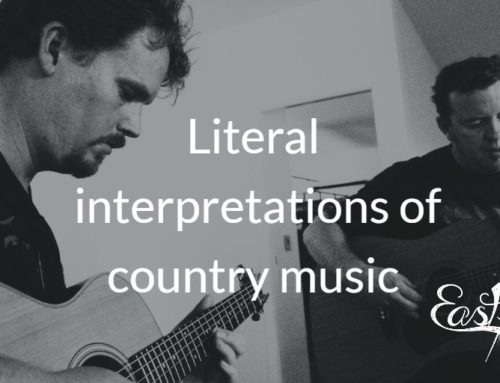I’ve been spending quite a bit of time at home recently; well, just not ‘at work’. The craziness has subsided, there are currently no deadlines, and I’ve been enjoying the down time. I think I’ve put enough nuts away for the winter (summer!), to keep paying the bills until work picks up again.
Home—and surrounds—is quite a nice place to be. I’ve spent a bunch of time getting to things that I just haven’t had time to do, cleaning windows, replacing flyscreens, making chilli sauce, gardening and cleaning gutters (well I paid a guy to do that…), and spending time with my son (2 years and 3 months) and my dad, which has been really cool. We went to the creek and saw a snake. I nearly stepped on it. I made a noise like a pig being hit in the nuts with another pig.
I’ve also been playing some guitar and recording some music—which you should listen to and pass on to your A&R friends.
I’ve been doing some really deep diving into the rabbit warren that is Wikipedia, delighting in discovering that there is a list of famous ship’s cats, and megatsunamis are a thing. Did you know Krakatoa exploding was the loudest sound in recorded history? It was heard over 4,500 kilometres away.
Intermittently, I’ve been trying to reengage with Twitter. Which brings me to the main point of this post.
In life we’re constantly bombarded with information. So much of it is put forth with a vested interest, from political rhetoric, through to other types of dream selling—be it overt advertising for products, or less overt ‘lifestyle’ media. You know the ones showing ‘successful’ people in shorts, sandals and jackets, with fabulous homes overlooking the sea. They play on innate cognitive biases (which affect us all—even if you’re aware of them), and takes up our most precious finite resource—time.
Do you ever get the feeling that there’s a lot more going on in the world then you can get at? Articles that are ‘all tip and no iceberg’, as Paul Keating (a former Australian prime minister, for those of you not from around here…) said, though he was talking about another politician…
I get this sense when I follow some stupid link that promises a lot more than it delivers. I get this sense about whole media outlets at times. Articles about new ‘research’ from some ‘institute’ that just may have been set up by the industry group that the ‘study’ favours. Certain publications don’t even bother to write anything new and just publish the press release verbatim…
And then there are those headlines that include a number and superlatives—either negative or positive—basically to get you to a site that swims in advertising, all designed to pull in money for some douchebag with a fake tan, a Ferrari and an empty place where his empathy should be.
And this clickbait bullshittery appears at the bottom of some supposedly serious publications… You’ve all seen links like this:
- The 5 foods you should never eat
- The simple tricks that experts don’t want you to know
- This woman makes $427 an hour from home…
Legally, I can’t say that it’s out-and-out fraud, so I’m not saying that. But, in my opinion, it seems spectacularly disingenuous, and these networked publications that run this kind of dross should be called out for it. It may not be their content, but they attach their ethos to it.
Back to the realm of Twitter (and other social media), I see people like tweets, or retweet, when it’s clear they haven’t read the linked article. When they wouldn’t have had time to read it, or where I can see the number of clicks on a link and the number of likes/retweets don’t add up.
Why do people do this? Why do you ‘like’ something that you haven’t read? Is it because [insert aspiration identity alignment group here]’ like things like this? Is it pure self advancement? Image crafting? Perhaps the same reason that people stick nationalistic stickers on their cars, buy a certain brand of clothing (and voluntarily pay to advertise for that brand!), wear their caps slanted at an angle that doesn’t block the sun, or wear shoes that they can’t actually walk around in?
Humans are complex.
What does this kind of mentality do to our society? What are the flow-on effects of creating the paradigm that flashy clothes, mansions and luxury cars are symbols of success? (And successfuller = betterer, never mind what these people do for their money.) In Daniel Kahneman’s book Thinking fast and slow, he refers to a study that demonstrated that when people were primed with ideas of money (in ways as simple as having a screensaver of money floating in a pool on a participant’s computer ‘before’ the test began), it made them less willing to help other people.
And our society is being primed in many more ways then this.
There’s a certain brand of chicken sold in a certain supermarket. It is the ‘Official Chicken’ of a certain ‘reality’ TV show. My God, I can’t believe that’s actually a thing, but it is. For the privilege of buying this Official Chicken (and its associated aspirations), you get to pay more than double what you’d pay for the non-Official Chicken. $18.49 a kilo vs $9.00. If you want it on a skewer, you’ll pay $25 a kilo. (I just checked these prices now online.)
Crazy madness.
And this is just one example.
And, it isn’t just being done by corporations trying to get your money; it’s politicians—of all flavours—trying to get your vote.
Please take the time to read things and make up your own mind. Be prepared to change your position if new facts emerge.
(If you’ve stuck with me this far on my New Year’s rant, thank you. I’m not saying I’m immune to this stuff either, but I’m trying to catch myself more often. If you’ve found ways of cutting through the bullshit—or just want to share a related rant of your own!—I’d love to hear about it in the comments below.)
Happy New Year. 2016 is going to be epic.






